
BAGHDAD, Aug. 16, 2007
PM Announces New Unity Government, But No Sunnis Aboard; New Blast Hits Baghdad
(CBS/AP) The search continued Thursday in Iraq for victims of a coordinated string of bombings two nights earlier that killed at least 250, but possibly as many as 500 members of a small religious sect in northern Iraq.
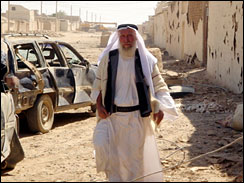
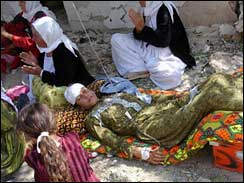
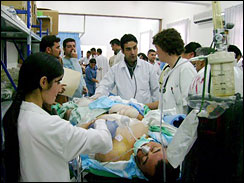
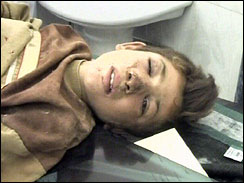
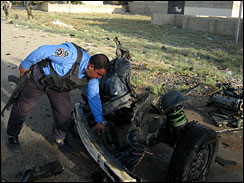
As emergency crews and bewildered residents sifted through the rubble of leveled clay houses in the northwest, a car bomb ripped through a Baghdad market district during the morning rush hour, killing at least nine people and wounding 17 more.
A police officer says the car was parked in a seven-story building on top of a row of stores and touched off a huge fire. There's been no claim of responsibility for the attack but it comes as U.S. commanders warn of more insurgent attacks ahead of next month's report to Congress on the progress on the war.
Meanwhile, the Iraqi prime minister and president announced Thursday a new alliance of moderate Shiites and Kurds, saying Sunni moderates refused to join but the door remained open to them.
Prime Minister Nouri al-Maliki said the agreement was the first step to unblock political stagnation that has gripped his Shiite-led government since it first took power in May 2006.
The announcement after three days of intense political negotiations in the capital was disappointing because it did not include Iraq's Sunni Vice President Tariq al-Hashemi and his moderate Iraqi Islamic Party.
President Jalal Talabani, a Kurd, said al-Hashemi refused the invitation to join in the new political grouping but "we have not closed the door to him."
The string of four suicide bombs that decimated two villages near the Syrian border Tuesday night was aimed at the Yazidi people, an ancient Kurdish-speaking sect that had previously avoided large-scale casualties amid Iraq's sectarian strife.
With a confirmed death toll of 250 already, it was the deadliest attack of the Iraq war since it began more than four years ago.
The blasts crumbled buildings, trapping entire families beneath mud bricks and other wreckage. Entire neighborhoods were flattened.
An American commander called the assault an "act of ethnic cleansing," and the military blamed the suicide attack on al Qaeda in Iraq.
"This is an act of ethnic cleansing, if you will, almost genocide," Army Maj. Gen. Benjamin Mixon, commander of U.S. forces in northern Iraq, told CNN. He said that was evident from the fact Yazidis live in a remote part of Ninevah province that has been far from Iraq's conflict.
The attack comes just as the American military is claiming the troop surge is making real progress, particularly against al Qaeda, reports CBS News national security correspondent David Martin. But al Qaeda still has the capability to hit where the American troops are not.
"What it tells me is they have to move to the remote areas to conduct their murderous acts," says Mixon.
Mixon said last month that he proposed reducing American troop levels in Ninevah and predicted the province would shift to Iraqi government control as early as this month. It was unclear whether that projection would hold after Tuesday's staggering casualties.
U.S. commander, Gen. David Petraeus said Wednesday he was preparing recommendations on troop cuts before he returns to Washington next month for a report to Congress, and believes the U.S. footprint in Iraq will have to be "a good bit smaller" by next summer. But Petraeus cautioned against a quick or significant U.S. withdrawal that could surrender "the gains we have fought so hard to achieve."
One military source says Petraeus wants to start pulling out troops in December, bringing home one combat brigade a month, so that by next June, troop strength will be back to the pre-surge level of 130,000, reports Martin.
Petraeus (seen at left) made his prediction while meeting with a group of former Sunni insurgents who are now fighting with the Americans against al Qaeda. By one estimate, 30,000 former insurgents have joined the fight alongside U.S. forces, a contingency equal in size to the entire U.S. troop surge and with much better intelligence on the whereabouts of the enemy, reports Martin.
In other developments:
A congressman wants clemency for a Marine from Plymouth, Mass., who is facing 15 years in military prison for the murder of an Iraqi civilian. Rep. William Delahunt, D-Mass., said Wednesday he recently sent a letter to the Marine general handling the case seeking clemency for Lawrence Hutchins III, who was demoted to private from sergeant after his conviction at Camp Pendleton, Calif. The congressman says it is a question of fairness since Hutchins is the only member of his squad to be convicted of murder in the case.
An Iraq security expert says withdrawing all U.S. troops, contractors and equipment could be done safely within a year. The U.S. military would prefer double that time. Anthony Cordesman of the Center for Strategic and International Studies says it would be feasible to pull out 10,000 troops a month and 10,000 contractors through Kuwait. He also says that by destroying equipment and abandoning facilities, the U.S. could be gone in as little as a few weeks and no more than a few months.
Zayan Othman, health minister for Iraq's autonomous Kurdish region, near the area of Tuesday's deadly chain of suicide blasts, said 250 bodies had been pulled from the rubble and some 350 people were injured.
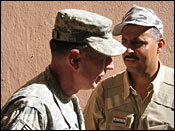
But the death toll was put as high as 500 by some local officials, including Hashim al-Hamadani, a senior provincial security official; Kifah Mohammed, director of Sinjar hospital; and Iraqi army Capt. Mohammed Ahmed. They agreed with Othman that about 350 were wounded.
None of the officials provided information on how they arrived at their estimates. The figures could not be independently checked because the area was under curfew and casualties had been taken to numerous hospitals.
Even the lower death estimate far surpassed the previous bloodiest attack of the war -" 215 people killed by mortar fire and five car bombs in Baghdad's Shiite Muslim enclave of Sadr City last Nov. 23.
U.S. officials believe insurgents have been regrouping across northern Iraq after being driven from strongholds in and around Baghdad, and the bombings coincided with the start of a major offensive by American and Iraqi troops against militants in the Diyala River Valley.
The carnage dealt a serious blow to the Bush administrations hopes of presenting a positive picture in a progress report on Iraq to be delivered by Petraeus, and U.S. Ambassador Ryan Crocker in about four weeks.
Petraeus warned that he expected Sunni Arab insurgents to stage more spectacular attacks ahead of the report to Congress, whose members are deeply divided over whether to begin withdrawing U.S. troops from Iraq.
"This is way out by the Syrian border, an area where we do think in fact some suicide bombers are able to come across the border. It's an area that is very, very remote -" quite small villages out there -" and it was disheartening for us, too, obviously," Petraeus told The Associated Press in an interview.
"We've always said al Qaeda would try to carry out sensational attacks this month in particular," he added. "We've had some success against them in certain areas, but we've also said they do retain the capability to carry out these horrific and indiscriminate attacks such as the ones yesterday. There will be more of that, tragically."


